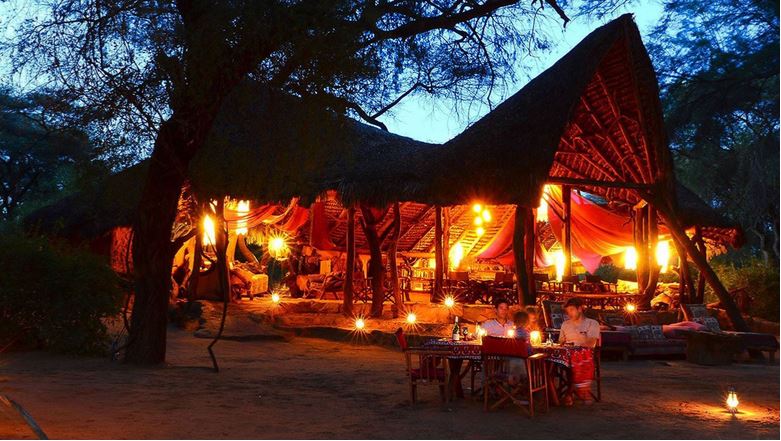Situated on the banks of the Ewaso Nyiro River in the Samburu National Reserve, the Elephant Watch Camp is home to some of the largest elephant bulls in Samburu. The camp is built entirely from recycled trees and logs, creating a beautiful eco-friendly camp. The camp blends completely with its surroundings and offers luxurious accommodation without the worries of harming our fragile ecosystem.
Due to the camp being located in an un-fenced reserve, the animal sightings are vast, from elephants, vervet monkeys, baboons, crocodiles, Egyptian geese to genet cats, porcupines, hyena and leopard.
Lodge Details
Style
A luxurious camp with eco-friendly detailing and a friendly hands-on team.
Setting
Situated in the dry north of Kenya, Elephant Watch Camp is perched on the banks of the Ewaso Nyiro River beneath wide-spreading Kigelia and Jarma trees in Samburu National Reserve.
There are no fences in the camp so wildlife can come and go freely as they please. Samburu warriors will escort you back and forth to your tent in the evenings and will keep watch throughout the night to ensure your safety.
Accommodation & Facilities
Elephant Watch Camp consists of 6 spacious, netted tents to catch the breeze and ensure privacy and protection. Each tent has its own veranda with a beautiful view of the Reserve.
Each room has a king-sized bed with blissful cotton sheets, comfortable feather pillows, bedside lamps, a flashlight, clean fluffy towels, a kanga bathrobe and a “bush cupboard” to hang and store your belongings.
The en-suite bathrooms are built around their own tree for privacy and hand-painted buckets are filled with clean cool water by day and, in the evening, steaming hot water heated by the sun is poured into your bucket-shower hanging from a branch.
All-natural toiletries are provided and laundry is collected daily and will be washed, pressed and returned within 24 hours.
Dining
All food is made on site with vegetables sourced from the foothills of Mt. Kenya and the meat mostly sourced from the camp’s organic farm in Naivasha or from the cattle ranches of Laikipia where livestock is pasture-raised and free to roam.
A wide range of delicious dishes are available and meals are planned to suit your needs, so picnic breakfasts and lunches are prepared to be unwrapped on the banks of a river as a herd of elephants stroll by. The local cuisine, roasted goat, is an option as a speciality of the camp.
Dinner is enjoyed under a black sky scattered with a million stars and in the distance, the tune of a Samburu flute keeps pace with an elephant splashing across the river.
Activities
Game drives are the core activity for elephant watching and the guides are trained to approach the animals respectfully so as not to disturb them. The drivers will take you right in to the middle of the herds to experience them in their most natural state in complete comfort and safety.
Dotted around the Samburu National Reserve are private secret spots where you can take a break and have a beautiful picnic in the wilderness. The chefs will have packed delicious lunches for you to enjoy and plenty of chilled drinks fill the cooler box.
Walking safaris are offered at the camp and there are options to search some of the small five – elephant shrews, buffalo weavers, ant lions, leopard tortoises and rhino beetles – or on a meandering bird walk with close to 400 species to identify. For those more adventurous, you can hike up the famous flat-topped sacred mountain, Ol Donyo Sapache, or the peaks of the Matthews’ range.
Other activities on offer at the Elephant Watch Camp include sundowners, visiting Save the Elephants, visiting a Samburu village, hiking up Ololokwe, going on a camel walk and taking a wild safari by helicopter. Each can be enjoyed and are guaranteed to create memories that last a lifetime.


